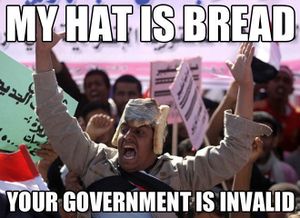Difference between revisions of "Activism Delegitimization"
m |
|||
| (3 intermediate revisions by 2 users not shown) | |||
| Line 14: | Line 14: | ||
==== Linked patterns ==== | ==== Linked patterns ==== | ||
| − | [[Silenced Voices]],[[Media Monopolies]] | + | [[Silenced Voices]],[[Media Monopolies]], [[Conservation Reliance]] |
| − | ==== | + | ==== References ==== |
| + | http://dictionary.reference.com/browse/activism | ||
| + | http://en.wikipedia.org/wiki/Delegitimization | ||
| + | <references/> | ||
Latest revision as of 16:51, 26 February 2014
Description
Dissenters, especially those who are active in their dissent can be delegitimized in order to take away their ability to be taken seriously by the public. This is very effective when done thru mass media outlets, but there are other ways to accomplish this as well. If your group has access to any media (T.V., Movies, Advertising, etc.) these can be used as well. One very effective form of delegitimization is ridicule because of how easily it can spread and how effective it can be.
How it works
Mocking, or pointing out hypocrisies of activists. Ignoring the message of a protest and focusing instead on the individual or group who are protesting. There are several other ways to delegitimize activism including developing the ideas that activism is hopeless, or that engaging in politics is a boring waste of time.
Evidence
This is a tactic often employed by political pundits and commentators. Here is Talk Radio Pundit, Rush Limbaugh, engaging in some activist delegitimization: http://www.youtube.com/watch?v=tKthEvX2luQ
Linked patterns
Silenced Voices,Media Monopolies, Conservation Reliance
References
http://dictionary.reference.com/browse/activism http://en.wikipedia.org/wiki/Delegitimization

